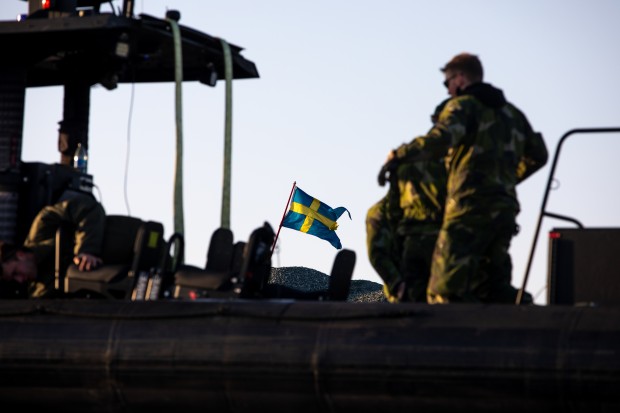Swedish forces exercise in northern Norway as the country officially joins NATO

NATO now counts 32 countries, of which the two newest did not have membership on the political agenda before Vladimir Putin in February 2022 ordered Russian troops to launch an all-out war on neighboring Ukraine. With Finland joining NATO in April last year, Russia suddenly got a 1,340 km longer border with the Western military alliance.
If Putin’s goal was to move NATO further away, he achieved the opposite.
Today, Sweden joined NATO after over 200 years of non-alignment.
“On March 7, 2024, the conditions for entry into force set forth in Article II of the Protocol to the North Atlantic Treaty on the Accession of the Kingdom of Sweden were fulfilled,” the U.S. Department of State announced as both Prime Minister Ulf Kristersson and Foreign Minister Tobias Billström visited Washington D.C.
Prime Minister Ulf Kristersson (left), U.S. Secretary of State Antony Blinken, and Foreign Minister Tobias Billström with the signed documents in Washington D.C. Photo: Tom Samuelsson / Swedish Government
“We will strive for unity, solidarity and burden-sharing, and will fully adhere to the Washington Treaty values: freedom, democracy, individual liberty and the rule of law,” the Swedish Prime Minister wrote on Twitter (X).
Secretary Jens Stoltenberg wrote on Twitter (X) that “Sweden’s accession makes NATO stronger, Sweden safer, and the whole Alliance more secure.”
From its Headquarters in Brussels, NATO Thursday evening said: “Today’s accession demonstrates that NATO’s door remains open and that every nation has the right to choose its own path.”
The Nordic footprint in NATO is highly visible in the northernmost regions of Finland, Norway and Sweden this week as thousands of soldiers train joint operations in the air, on the ground, and at sea. The bi-annual Norwegian-led exercise Cold Response has this winter changed its name to Nordic Response.
On Thursday, about 4,000 Finnish and Swedish soldiers make ready to cross the border between Enontekio in northern Finland into Kautokeino in Norway. The exercise includes 20,000 soldiers from 13 countries and is the largest military maneuver so far north of the Arctic Circle ever by the Alliance’s member states.
Finnmark region, where Norway borders Russia, is becoming more and more strategically important for NATO. Photo: Thomas Nilsen
The exercise aims to demonstrate that NATO has the capability, will, and strength to defend its territory and its northern flank.
Protecting the northern regions of Sweden and Finland requires that allied forces transport troops and weapons across the borders from Norway’s coastline into Norrbotten and Lapland. More than 100 fighter jets are participating during Nordic Response and at sea are some 50 warships, landing vessels and submarines.
This week, the main focal point is around Alta and Kvænangen, more than 250 kilometers from the border with the Kola Peninsula where Russia’s Europe-based naval nuclear weapons are deployed.
The Foreign Ministry in Moscow this week again repeated that response to Sweden’s NATO accession will be taken.
“We will closely monitor what Sweden does in this aggressive military alliance, how it will implement its membership in practice,” spokesperson Maria Zakharov repeated in her weekly media briefing.
As reported by the Barents Observer yesterday, Russia’s Northern Fleet and long-range maritime aviation keep close eyes on what happens outside the coast of northern Norway.
Sweden’s flag will be raised alongside those of the other 31 Allies in a ceremony at NATO headquarters in Brussels on Monday, 11 March, and simultaneously at NATO commands across Europe and North America.
NATO Headquarters for Supreme Allied Commander Transformation in Norfolk, Virginia. From Monday, the Swedish flag will be alongside the 31 others. Photo: Thomas Nilsen